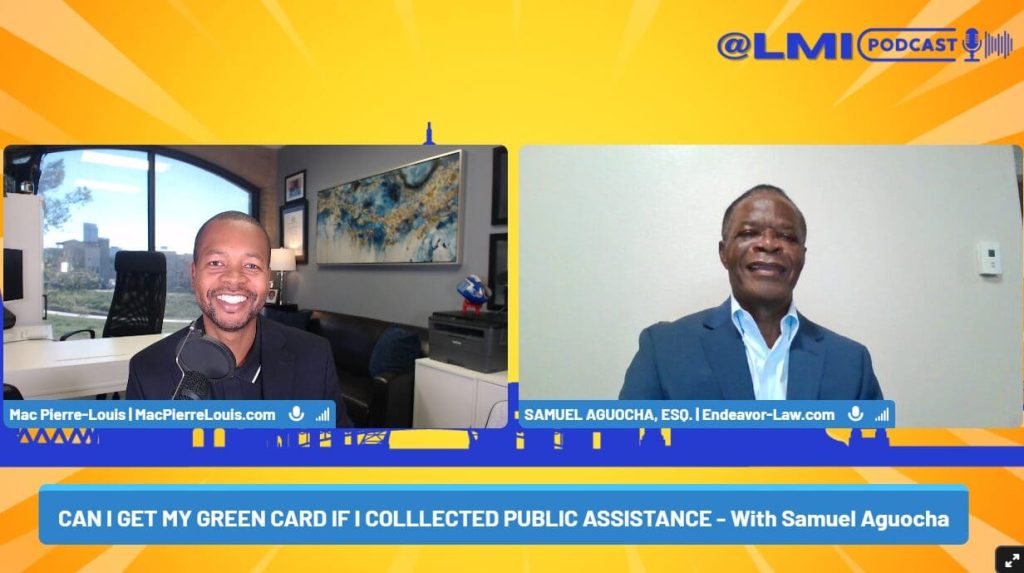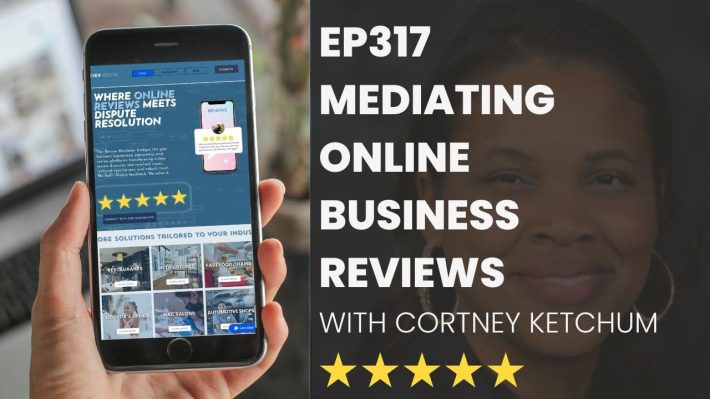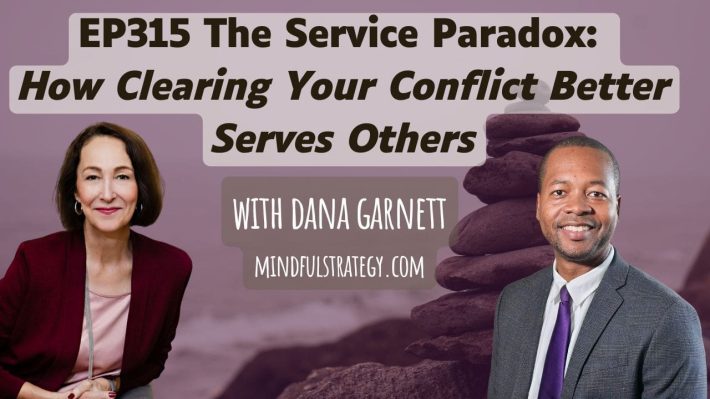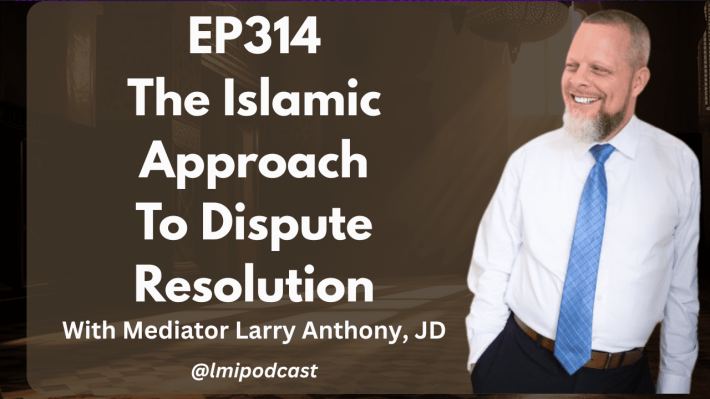EP258 Can I Get My Green Card if I Collected Public Assistance?

Attorney Mac Pierre-Louis and immigration lawyer Samuel Aguocha discuss whether receiving public assistance affects a person’s eligibility for a U.S. green card. Samuel explains that despite concerns, collecting public assistance does not automatically disqualify someone from getting their green card or citizenship, provided that the individual didn’t obtain the benefits fraudulently. Samuel also discusses the impact of immigration law changes and emphasize the importance of consulting legal professionals for personalized advice.
Top Keywords
1. Green Card
2. Public Assistance
3. Immigration Law
4. Legal Advice
5. Citizenship
6. Food Stamps
7. Fraud
8. U.S. Residency
9. Immigration Attorney
10. Legal Consultation
TRANSCRIPT;
0:01 Can I get my green card if I collected public assistance?
0:04 That is our topic for today.
0:09 Welcome to the Lawyers and Mediators International Show and Podcast, where we discuss law and conflict resolution topics to educate both professionals and everyday people.
0:19 Catch regular episodes on YouTube, and any way you get your podcasts.
0:23 Just remember, nothing in these episodes constitutes legal advice, so be sure to talk to a lawyer, as cases are fact-dependent
0:35 Hey everyone, this is attorney, Mac Pierre-Louis, lawyer, mediator, arbitrator, and working throughout Florida and Texas.
0:41 And as you know, this podcast series talks about the law and conflict resolution topics.
0:47 And so today is no different.
0:49 We’re gonna be talking about immigration law.
0:52 And so today I have a guest with me, Samuel Aguocha.
0:56 And Samuel is a lawyer, colleague of mine.
0:58 He’s a friend of mine.
0:59 He has, he and I used to actually office close together when we were working in a building out here in Houston.
1:08 And so just wanted to introduce him and have him talk to us today about this topic in immigration law.
1:14 Samuel, how are you doing today?
1:16 I’m good, good to see you again, Mac. Yes, sir, you do.
1:20 And so tell everybody a little bit about yourself to start things off.
1:25 All right, hi guys,
1:28 my name is Samuel Aguocha I am an immigration attorney.
1:35 I am stationed here in Houston, Texas.
1:38 Houston has been my home now for a good number of years.
1:44 I got some of my education here in Houston and a little bit overseas.
1:50 So that’s really who I am.
1:56 But today we’re going to touch a topic that a lot of people call.
2:01 Oh, I have a small question.
2:05 Yeah, you know, can I get my green card?
2:10 If at any time in the past, I have received the public assistance.
2:16 Yeah, so Samuel, let me ask you, do you get that question a lot first off?
2:21 Yes, I do.
2:23 And I’m just curious.
2:25 Typically, is it like a consultation kind of question?
2:27 Or is it something that people don’t really talk about until later when you’re in the middle of a case?
2:35 No, a lot of time, they’re just call.
2:37 That’s the only reason they call.
2:39 Yeah.
2:40 And all they want to know is, oh, I have five kids and they send me and
2:49 my wife a paper that we qualify for food stamp.
2:53 But we’re kind of scared.
2:55 We don’t want something to come in the future to hurt us.
2:59 Yeah.
3:01 Okay, is that all you want to know today?
3:05 Yeah, that’s all we want to know.
3:07 Yeah.
3:07 I said, okay, then we move on and explain to them what is going on and how it’s come to be.
3:16 Yeah, well, tell us, what is then the answer?
3:20 Can, if somebody is in this country and they want to get their residency, but they have received some kind of public assistance, okay, and then you can define it.
3:31 Maybe it’s TANF, maybe it’s food stamps, whatever.
3:35 Um, the taxpayers footing that bill, right?
3:38 So can somebody get the green card if they have been getting public assistance?
3:46 The answer there is
3:49 yes,
3:51 but I wouldn’t be doing you a good service.
3:54 If I just say yes and keep quiet, of course, it’s, it depends, right?
3:58 It’s always the answer we lawyers give.
4:01 It depends.
4:02 So what does it depend on?
4:04 So right now, actually, let me take you back a little bit.
4:09 All right.
4:10 What happened was during the past administration, there was an effort to limit or disqualify and otherwise qualify the candidates from getting it at their green card or their citizenship.
4:32 When that committed being, there was some kind of controversy.
4:37 And of course, we are contrary of a lawsuit and lawsuit.
4:41 So there was a lawsuit.
4:43 And that lawsuit went to
4:46 appeals court.
4:48 So the court of appeals put an injunction on that.
4:53 In other words, they said no, this rule cannot go into effect, because it will be a violation of the constitution.
5:09 So to answer your question, you will still see the question in your application.
5:18 You will still have to answer it truthfully.
5:22 If you have at any point received any aid from either in form of a
5:31 food stamps, in form of a going to a hospital, or cash, advance something like that.
5:39 But remember that immigration law changes just like weather changes.
5:47 So at this point in time, yes, you can get your green card or your citizenship, even if you have in the past received public assistance. Of course, the law can change.
6:02 If it changes, we don’t know what it will be.
6:05 But for now, it will not disqualify you from getting your green card or your citizenship.
6:11 So you’re saying right now, at this point in time, it does not disqualify you from getting your green card or citizenship?
6:18 Yes, it will not.
6:20 Correct.
6:20 Well then, what about extreme situations?
6:24 I’m guessing there’s always an exception to every role So, is there a situation where you can imagine, okay, you’re gonna have a really hard time getting your green card if you have taken a certain
6:35 number or a certain amount of public assistance.
6:38 What do you think?
6:40 Generally speaking, no.
6:43 There is no limit of you being disqualified if otherwise you were qualified.
6:54 Of course, if there is evidence that you did not get that support
7:04 in good faith, meaning that you have lied on the application trying to get that full stamp.
7:12 That itself, it’s not the amount or the help itself.
7:17 That itself may disqualify you.
7:20 Got it.
7:21 So it’s the fraud that can become an issue, right?
7:25 And if you’re, if you’re getting public assistance, you know, by lying then if that comes out that might you know give you a black eye to the immigration authorities. That is correct.
7:38 That might give you a black eye and that is why whenever you’re applying for anything it is important that you talk to a lawyer even though you may not like lawyers. But talk to them.
7:53 They are more likely to direct you to the right direction Which could mean that even if you have lied on that application, the question is that lie standing alone, Would it
8:11 be a reason to disqualify you if you otherwise qualified.
8:18 Got it.
8:19 So
8:21 Okay, I mean that answers the question.
8:23 I was curious by the answer actually and And since immigration law is federal, then
8:29 this shouldn’t matter where or what state you live in, correct?
8:33 So it doesn’t matter if you’re in Texas or Florida or Virginia.
8:36 No, it shouldn’t matter because you look at the forms.
8:39 The forms are kind of, you know,
8:43 universal, regardless of the state you live in, whether you live in the Southern state or the Northern state, the red states or blue states, it doesn’t matter.
8:55 Got it.
8:56 So, well, you’re part of where I say blue states So I, you know, we talk about politics sometimes.
9:01 Well, not really on this channel, but I was gonna say this whole topic is, would you agree with me is kind of controversial?
9:09 Do when people discuss, you know, whether we call it welfare or we call it public assistance,
9:18 is that something that can stir a lot of emotion, a lot of strong emotion, especially on this topic because it’s mixed in with immigration?
9:27 Actually.
9:29 Yes, because when you are looking at applicants that are applying maybe for green card or for citizenship, there is always a heightened anxiety.
9:44 Yeah.
9:45 Whether founded or unfounded, that is beside the point point, there is already a heightened anxiety.
9:52 And when they are asking that particular question, would it, if you look directly into their eye, you will see that there is some kind of anxiety there, there is some kind of a, Oh, are we going
10:08 to get it or are we not going to get it?
10:11 That’s you, the practitioner, you are the one there to, if you like, calm the stormy water, so that they know that they are going to get it. There is no reason to lose sleep.
10:27 Unless there is something else that they have not disclosed to you, which a lot of times some clients do that, but that standing alone is not a reason for you not to get your papers.
10:38 Yeah, if
10:40 somebody has the fear that if they disclose the truth, it might somehow hurt them.
10:46 Would your advice always be, look, you gotta just tell the truth.
10:51 Well, you always tell them to disclose everything to you.
10:56 Yeah a lot of time, clients can disclose what they think that you need to know.
11:05 That’s just the, I mean,
11:11 you know, the reality.
11:11 Right, that’s reality.
11:11 Yeah.
11:11 Unless if you think they haven’t told you everything, you start to poke into that question.
11:18 When you start the poke into it, more and more, maybe things will come out.
11:23 And things usually do come out.
11:26 And when it comes out, that gives you the lawyer, the opportunity to package their pepper in a way that they would get what they are looking for.
11:38 So they don’t realize that, but it’s up to you to try as much as you can, to get to the truth.
11:46 Got it.
11:47 So, Samuel, because of time, let me share your website.
11:52 This is Endeavor-Law. com
11:55 And if people want to contact you, of course, they can, of course, go there.
11:59 It has all your information.
12:01 Okay.
12:02 And that’s Endeavor-Law. com.
12:08 And, but is immigration the bulk of what you’re practicing these days, or are you doing all the work as well, if people wanted to reach out?
12:19 90 of what we do these days is immigration.
12:25 And when you hear the word immigration, it is very, very fast.
12:31 Of course, that includes asylum.
12:35 That includes people that have been detained for one reason or the other.
12:41 And the next of kin is more likely to call and say, Oh, we want him to get out.
12:48 Correct.
12:48 You know, what can we do?
12:50 So it’s up to you to come and tell them, Hey, we can help that’s your next of kin to get out.
12:60 But talk to us a little bit.
13:02 Does he have a wife?
13:05 Does he have children?
13:08 Does he have a relative here?
13:10 Because those are one of the things that the court would be looking at in order, when considering if that person is going to be a flight risk
13:20 Got it.
13:21 Yeah, well, we could talk about immigration all day.
13:24 There’s a lot of questions.
13:26 I’m an immigrant myself into this country.
13:29 And so, having gone through the process and then trying to contribute to this American society,
13:36 I know that there are so people who are in line, who are trying to do it the right way.
13:40 And as they naturalize over time, and as they get their green cars over time, there’s a lot of questions, a lot of pitfalls, a lot of roadblocks along the way, there’s so many things.
13:51 So we could have
13:53 many, many hours of discussions with regards to different immigration topics.
13:58 So definitely want you back so we can talk about these topics.
14:02 And if people out there have questions, they can tune in, and Samuel Aguacha Esquire at Endeavor-Law. com.
14:10 That’s Endeavor-Law. com.
14:11 All right,
14:16 Samuel, did you want to close us out?
14:19 Anything you want people to remember about this topic today, about green cards?
14:23 Well
14:24 If there is anything that you might have heard today that I want to stick in your mind and in your brain, it is that being an immigrant is part of what makes us who we are as America.
14:45 When we come to that of something that can stop you from getting your papers,
14:52 like we discussed today in the area of getting public assistance, you want to know that that standing on itself will not be a reason for you not to get your papers.
15:08 That is the way the law is made and that is the way it is at this time.
15:14 All right, all right guys, stay tuned until next time.
15:17 Talk soon, Samuel, thank you



